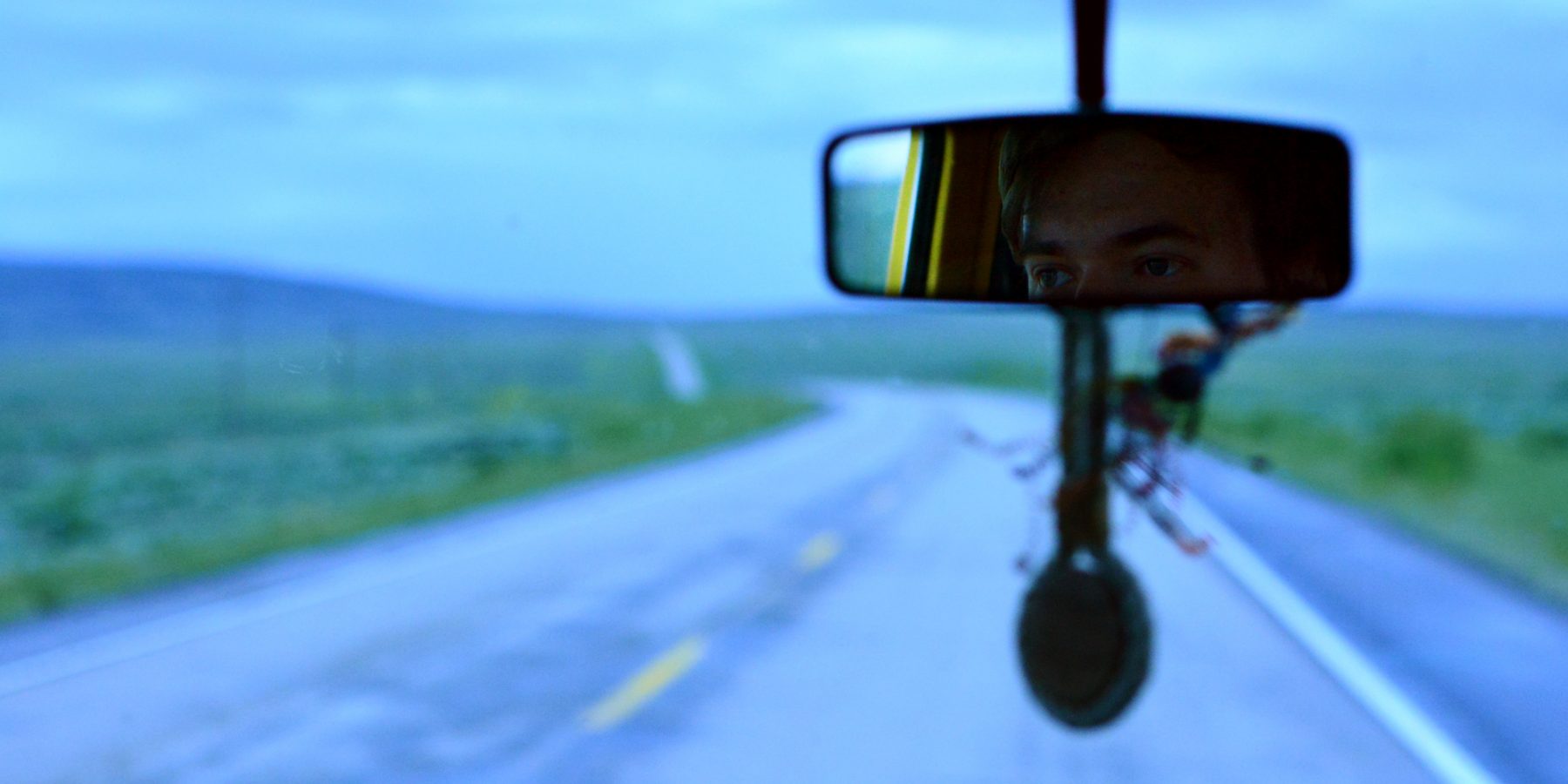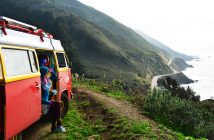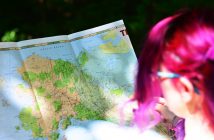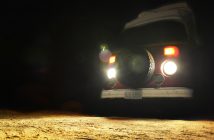We are about to leave the United States and head into Mexico. About time to take a look into the rear view mirror. Where have we been? What has happened? What have we learned? Come join us on a short hike across the past 9 months, to people and places that have made a lasting impression.
Another border crossing, but not one like any other. This one is special. It is the farthest gap in both culture and language that we have to cross in one small step (or one small revolution of the engine, in Big Emma’s case), it is also the only border on our trip between what scientists call an industrial country and a developing country. We cross from Anglo-America into Latin America.
In the United States, we’ve traveled along seismic and political fault lines, through canyons and valleys, past little ponds with a lonely Trump billboard on a tiny, isolated island. We’ve seen wealth and poverty, unimaginable stupidity and genius only the blink of an eye apart. We’ve seen a country divided, and united in its division. We’ve driven up and down the western half of this continent, seen forests and deserts and most importantly, we’ve met the most amazing people on the way. Take a short hike with me across the past 9 months.
It’s raining on us in a trailhead parking lot in Anchorage. Under a sloppily-attached tarp that allows the rain to still drip through the cracks onto our heads, we try to replace a wheel bearing. A task we’d never done before and only started in the late afternoon, our chances of success are slim. After hours of wrenching and cursing, greasing and getting drenched, we give up and get the car back together enough to drive. It’s long after midnight and nothing is accomplished, except that we learned not to make attempts on changing wheel bearings in the pouring rain. Alaska has been filled with moments like this. Learning how to do things, making beginner’s mistakes.
Our personal Last Frontier
The Last Frontier, for us, was just as much a personal frontier as it was a natural one. The vast distances and harsh terrain were accompanied by a steep learning curve on how to travel and live in our Bus and with each other. Sometimes the unending space between the places we traveled to was smaller than the space between our two minds. Sometimes we felt like we had figured it out, sometimes the glaciers didn’t seem to be outside, but in our Bus, freezing every effort of compassion in midair, and shattering our understanding for each other into a million tiny icicles.
But just as a sunny day is enough to dry our clothes and curtains from a week of rain, the good moments made up for the bad ones, and day by day, moment by moment, we learned to live in our tiny environment and accept each other’s closeness as an advantage rather than a burden.
A man walks into a bar…
Alaska made an impression on us in many different ways, but a major one was definitely its people. One of the most interesting characters we met in the far North is Jason. We were enjoying a rare splurge, an afternoon drink at a rare kind of place, a hip craft brewery in Alaska. There are only two breweries in Fairbanks (an unimaginably low number for anybody living on the West Coast of the US), and HooDoo Brewing, we were told, is the one to visit if you only have money for one.
So here we were, sipping our Far North IPA and this guy walks up to us. “Sweet ride”, he says, which is not overly original, but there was something about him that made the conversation continue. The long dreadlocks falling over his shoulder, a missing tooth showing every time he smiles, but a witty and smart smile it is. After a good hour of talking about traveling and life and beer, eventually leading to more beer at another bar, leading to an invitation to his housewarming party to the place he had just moved into with his brother.
Meeting Jason turned into one of the best experiences we had in the north. We learned how to cook salmon and moose, tried Halibut he had caught himself, and experienced the troubles of life in Alaska. We learned that lots of people up here live in dry cabins, meaning their house is a log cabin with no access to running water. Instead, they use facilities at the university or local gyms to shower and do laundry – a strange parallel to vanlife.
The garage of Jason’s new home is slowly swallowed by the melting permafrost ground. Digging wells around Fairbanks seems to be kind of a gamble. Sometimes they come out great, sometimes not so much. The water coming out of the faucets of Jason’s house was so full of iron it smelled like metal. A filter system somewhat improved the situation, but brushing your teeth still felt like chewing on a cast iron pan.
At home with Santa
Other people made lasting impressions on us as well. Only a 20-minute drive from Fairbanks lies the small town of North Pole. Bearing this iconic, yet somewhat misleading name (North Pole is still thousands of miles away from the actual north pole, no matter if you count the geographical or the magnetic one), North Pole has named itself the official home of Santa Claus. Streets have names like “Mistletoe Lane”, and virtually all light posts in the city resemble gigantic candy canes.
In this strange place, we were invited into the home of the Riveras, a travel-crazy family with three children. Alica and Alex homeschool their kids to be able to travel throughout the year and show them the world, rather than limit them to reading about it in textbooks. And it works. Despite being only 11 years old at the time, their oldest daughter is one of the smartest people I’ve ever met. “I like that you guys are not married. I personally don’t believe that marriage is very important”, she says to Emma one day. She also quotes Wikipedia from memory whenever there is an opportunity to correct her mother on factual mistakes, but doesn’t lack the ability to be an 11-year-old kid doing silly things.
Time to move on
We left the Riveras and Alaska with a heavy heart. If getting to know new people and places is the intoxicant of this drug known as traveling, then saying goodbye is the hangover after it. And the more we got drunk on Alaska and its people, the more crushing was the headache of leaving them behind. But it had to be done and new places and people would await further south.
It’s raining on us in the forests of Oregon. I can’t see out of my window for all the moisture fogging up the glass, but I can see the drops leaking through the rubber seal below the window into the car. Drop by drop, the water finds a way through the tiny cracks in the black rubber, drop by drop accumulates on the windowsill until gravity forces it to abandon its post and pulls it down the wooden door cover.
The way down south
We are somewhere outside of Tillamook, a small coastal town with a cheese factory that makes the best sharp cheddar outside of Wisconsin. Over the past weeks, we have traveled across Canada south to Vancouver, where I met my Brazilian host brother again for the first time in years. We have seen Orcas swimming past our ferry to Victoria. We spent time with the local Volkswagen community in Seattle and were overwhelmed by their hospitality. We camped with hundreds of other vanlifers next to a meteorite crater in Deschutes National Forest. We listened to NPR on our emergency weather radio at a campfire somewhere in Washington, with the growing feeling that this radio had “emergency” in its name for a reason, as one state after another was called for Trump.
Perspectives change with color
Shortly after the election, we visited Shameem, Emma’s 3rd-grade teacher in Portland. Now a friend of the family and an amazing chef, she offered us her home and we stayed for a week as we digested the election results and saw the country react. While peaceful protest turned violent in downtown Portland, we were presented with the broader consequences of the election. Shameem, being of Indian descent and having grown up in a Muslim family, is also a university professor for teaching, and a liberal activist. For her, that week was simply one of depression and fear for the future.

Shameem and Emma on a rainy post-election day
The saying that only white people can afford not to care about race and racists had never before rung so true to me as then. I could like the result of the election or not, as a white male (and even more, a visitor to this country) it was easy for me to pretend this major shift in American politics didn’t affect me. But for her, things were different. The fact that a man who frequently had made racist and chauvinist comments in public had been elected president and the further fact that these comments seemed to have aided in his election made her fear for her safety, and that of everyone she stood for.
Would an aura of white supremacy in the White House lead to more violence against immigrants and people of color? Would a hardline conservative agenda lead to cuts in education, especially for immigrant children? I could easily ignore these questions and decide that they didn’t affect me, but Shameem, the university professor of color, couldn’t. For her, they were real, immediately important issues that she dealt with every day. Despite the somewhat depressing atmosphere in that Portland house, there was no better place for us to be in the week after the election.
How could we have missed this?

A lonely Trump sign on a lonely island
Before the election, we hadn’t paid much attention to the myriad of Trump signs in yards all over the rural Pacific Northwest – in states that are notoriously liberal. But after it, we couldn’t help but think, Where were all the Hillary signs? Why didn’t we ever notice this utterly disproportionate ratio? How could it have come as a surprise to us that all the polls were wrong if they apparently only ever questioned city people? It might just be true, we do only see what we want to see, and not what is there. After this realization, we vowed to pay closer attention to the world around us, rather than just making assumptions. Something we thought we were fairly good at, until now.
It’s raining on us in the Hidden Valley of Joshua Tree National Park. The Mojave desert, one of the driest places on the continent, proves to be just as vulnerable to the torrential downpours as any other place we’ve been to in the Western US. Within hours, the desert begins to process the water and turn it into life. Every pore of every cactus soaks up the liquid, it runs through the plants like blood through our veins, pumping through dried-out cell channels and activating its chlorophyll production. It takes less than half a day for the palm trees and cacti to turn from dusty brown to a lush green. Meanwhile, the sand can’t soak up the water and it creates streams where there was nothing the day before. In the campground, a river runs through it right behind Big Emma. A tent sits right in the middle of the stream, a nylon island in a white water rafting dream.
The drought is over
We experience a few more winter storms throughout our travels in California. In the hills of Palo Alto, we drive through rivers on roadways and dodge mudslides and fallen trees on our way to a friend’s house. There, we cook on our propane stove in the light of our headlamps for over a day, as falling trees have downed the power lines. In Santa Clarita, we watch more roads flood and rivers run through well-kept front yards of luxurious middle-class mansions. We watch a sinkhole swallow a car in Hollywood’s Studio City live on television that same night. A few weeks later, San Diego County declares the 6-year-long drought to be over, as the deserts are green and the reservoirs overflowing.
California has been the longest stop on our trip so far. In no other state have we spent almost 3 months. But as any other state, California has managed to keep so many secrets hidden from us that we by no means can declare “We’ve seen California” without being called liars. In an equal manner, Alaska has allowed us to only see a small fraction of itself, and Washington and Oregon have kept their entire eastern halves hidden from us. But nonetheless, the adventure feels complete, and it’s time to move on.
Who will fade and who will stay
We visited old friends and made new ones, reinforced old connections and tied strings leading to new people into our yarn ball of friendships. Some people might stay transient acquaintances that will fade from our view over time, but others will last. It is hard to know who will stay and who will fade, but I will take a gamble and say that Robbie might become a reoccurring character on this trip, and so might Brian and Chloe. We’ve known of them long before we met through the Online VW community, but it wasn’t until we met in person that we realized how well we click together. They are the reason we spent a disproportionate amount of time in the nice-but-slightly-boring towns of Santa Clarita and Oceanside, and they are the reason we will feel regrets about leaving California in our rear view mirror.
Time to move on
The United States and Canada have provided us with amazing experiences over the past 9 months. Their rich subcultures have helped us to ease into vanlife and keeping our vintage car healthy and alive, and the vast beauty of their lands and people have made us feel welcome wherever we went. But it feels complete. Anglo-America has given us everything it had, and we have given back everything we could. There could always be more adventures, but it would feel like more of the same. Like with TV shows, it’s better to end it in style than producing an entire boring season about a single wedding weekend. We’ve chased down our yellow umbrella and it has protected us from drought-ending rainfalls, now it’s time to move on.
Goodbye USA, we’ll see you again, someday. Take care of yourself and don’t do anything too stupid while we’re gone… But who am I to tell you this.
This post is part one of a series of two posts about leaving the United States and starting our Latin American adventures in Mexico. Also read part two, “Hola Mexico“!











6 Comments
Thank you Sven. Looking back at your less travelled roads with you was a sheer joy. Your writing and insights never fail to amaze me. I wish you, Emma, and Big Emma safe travels as you wind your way through unknown lands. All my love to you both.
Thank you Shameem! We are really glad you enjoy our writing, and we wish we could spend more time with you, stopping by for a weekend or something would be great. If only distances weren’t linear…
Sending our love from the road!
it feels like beeing there with you- while reading…. take care of you !!! kim’s mum …… ????????
Hello the two of you – thanks for letting me look into your rear view mirror!
I wish you continued inspiring and safe travels in the future!
As a wannabe-statistician, I’d like to add some things re polls: first, poll people make quite some effort when wanting to say something about the (e.g., US-)population on the basis of a biased selection of people. This includes, e.g., re-weighting cases on the basis of demographic information as assessed, or explicitly including uncertainty when making forcasts. second, as upsetting and damaging the consequences are, the actual forecasting error seems to have been of rather unspectacular size. I include two links to blog posts on this matter. The author is Andrew Gelman, a somewhat inspiring statistician and political scientist.
http://andrewgelman.com/2016/11/09/polls-just-fine-blue-states-blew-red-states/
http://andrewgelman.com/2016/11/11/election-surprise-three-ways-thinking-probability/
I hope you put your creative energies together some day and write a book about your journey. You both have a wonderful way with words and your observations about your experiences thus far are a joy to read!
Aw thank you Stephanie, it’s awesome to hear that! We might just do that, but probably not until everything is over 🙂